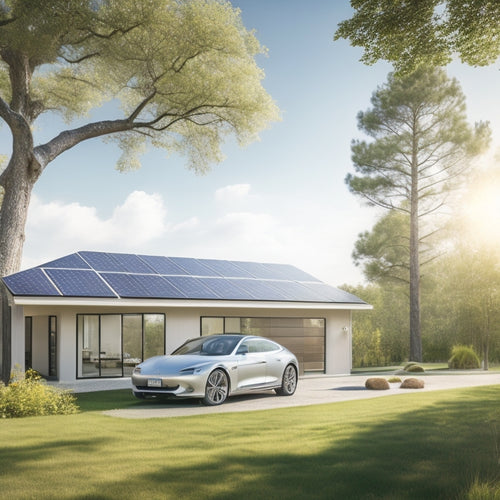
5 Solar Cost Savings for Homeowners
Share
By installing solar panels, you'll immediately start reducing your electricity bills, thanks to the free energy generated from the sun. You'll also increase your property value, potentially adding up to $15,000 to its sale price. Plus, you'll benefit from lower maintenance costs, with fewer than 1 in 1,000 panels requiring replacement in their 30-year lifespan. The federal government offers a 26% tax credit on total system costs, and net metering allows you to generate electricity and offset your energy consumption. As you investigate solar energy further, you'll uncover even more ways to save and optimize your investment.
Key Takeaways
- Solar panels generate free energy from the sun, reducing reliance on the grid and immediately lowering energy expenses.
- Homeowners can claim a 26% federal tax credit on total solar system costs, providing a significant incentive to invest in solar energy.
- Solar-powered homes sell for up to $15,000 more than non-solar homes, increasing property value and appeal to eco-friendly consumers.
- With minimal maintenance costs and a 25-year warranty, solar systems provide decades of clean, reliable energy at a lower cost.
- Net metering allows homeowners to generate electricity, export excess to the grid, and receive credits on their utility bills, further offsetting energy costs.
Reduced Electricity Bills
By going solar, you'll start slashing your electricity bills from day one. This is because solar panels generate free energy from the sun, reducing your reliance on the grid and lowering your energy expenses.
With energy efficiency at its core, solar power helps you consume less energy and reduce your carbon footprint.
As a homeowner, you'll benefit from solar incentives that further reduce your costs. The federal government offers a 26% tax credit on the total cost of your solar system, greatly cutting down your upfront investment.
Additionally, many states and utilities provide rebates and credits that can offset the cost of going solar.
With a solar system, you'll produce clean energy during the day, which can power your home and reduce your energy consumption from the grid.
This leads to lower electricity bills and long-term savings. By utilizing the power of the sun, you'll enjoy reduced energy expenses, increased energy independence, and a more sustainable future.
Increased Property Value
How much can a solar system enhance your property's value? As a homeowner, you're likely to see a significant increase in your property's worth once you install solar panels. This is because solar systems are a highly sought-after feature in today's real estate market.
In fact, according to the National Renewable Energy Laboratory, homes with solar systems sell for up to $15,000 more than similar homes without them.
Here are 4 key benefits that contribute to this increased property value:
-
Energy Efficiency: Solar systems reduce your reliance on the grid, providing a clean and efficient source of energy that appeals to environmentally conscious buyers.
-
Environmental Impact: By reducing your carbon footprint, you're not only helping the planet, but also increasing your home's appeal to eco-friendly buyers.
-
Increased Curb Appeal: Solar panels can add a sleek, modern touch to your home's exterior, making it more attractive to potential buyers.
- Long-Term Savings: With solar systems, buyers know they'll be saving money on their electricity bills for years to come, making your home a more desirable investment.
Lower Maintenance Costs
Lower Maintenance Costs
Fewer than 1 in 1,000 solar panels require replacement in their 30-year lifespan, making solar systems an extremely reliable and low-maintenance investment. This means you'll spend less time and money on repairs and replacements, ensuring a higher return on your investment.
With solar panels, you can expect minimal maintenance costs over the system's lifespan. In fact, most solar panel manufacturers provide a 25-year warranty, giving you added peace of mind.
As a homeowner, you'll benefit from reduced maintenance expenses, which can add up quickly. Traditional energy sources, like fossil fuels, require frequent maintenance and repairs, driving up costs.
In contrast, solar systems require little to no maintenance, reducing your overall energy expenses. Additionally, the initial installation expenses are offset by the system's longevity, providing you with decades of clean, reliable energy at a lower cost.
Federal Tax Credit Benefits
You can substantially reduce your tax liability with the federal tax credit benefit, which allows you to claim a credit of 26% of your total solar panel system cost.
This credit is a significant incentive for homeowners to invest in solar energy, making it more accessible and affordable.
To be eligible for the tax credit, you must meet certain requirements, including:
- Owning the solar panel system (leasing doesn't qualify)
- Using the system for generating electricity in your primary or secondary residence
- Having a tax liability to claim the credit against
- Meeting the installation requirements, which include a completed solar installation process and a system that meets specific safety and performance standards
Net Metering Savings Opportunities
In addition to the federal tax credit, another significant cost savings opportunity for homeowners comes from net metering. This program allows you to generate your own electricity and export any excess to the grid. You'll then receive credits on your utility bill, offsetting your energy costs.
| Net Metering Benefits | How it Works |
|---|---|
| Reduced Energy Bills | Excess energy produced is fed back into the grid, offsetting your energy consumption |
| Increased Property Value | Installing a solar panel system can enhance your property's value |
| Solar Energy Credits | You'll earn credits for excess energy produced, which can be used to offset future energy bills |
Net metering regulations vary by state, so it is crucial to understand the specific rules and incentives in your area. By taking advantage of net metering, you can maximize your solar cost savings and enjoy a significant return on investment. With net metering, you'll be generating your own clean energy and saving money on your utility bills.
Frequently Asked Questions
How Long Do Solar Panels Typically Last?
You'll be pleased to know that solar panels typically last between 25 to 30 years, with some manufacturers guaranteeing a solar panel lifespan of up to 40 years, requiring minimal maintenance requirements, such as occasional cleaning and inspection.
Can I Install Solar Panels on My Old Roof?
Installing solar panels on your old roof is like adding a new engine to an old car - it's possible, but you'll need to assess the roof's condition first, as a weak foundation can increase installation costs and compromise the system's performance.
Are Solar Panels Resistant to Extreme Weather?
You'll be glad to know that solar panels are designed to withstand extreme weather conditions, ensuring their durability isn't compromised; they're built to resist weather impacts like heavy snow, strong winds, and intense hail, allowing you to capture power reliably.
Do Solar Panels Require a Lot of Space?
You've likely seen massive solar farms, but surprisingly, you only need a small plot to utilize significant power. Consider this: a typical residential solar panel array spans about 300-400 square feet, yet can generate 5-6 kilowatts, thanks to high solar panel efficiency and thoughtful installation considerations.
Can I Sell My Excess Energy to the Grid?
You can sell your excess energy to the grid through net metering, which measures the difference between your energy production and consumption. This allows you to offset your utility bills by selling energy back to the grid, reaping net metering benefits.
Related Posts
-

Why Invest in Solar Car Battery Chargers Online?
By investing in a solar car battery charger online, you're not only reducing your reliance on fossil fuels but also o...
-

10 Tips for Cleaner City Air With Scooters
By adopting a few simple habits, you can make a significant impact on reducing city air pollution with your scooter. ...
-

10 Best Ways to Purify Urban Air With EVS
You're looking for ways to purify urban air with Electric Vehicles (EVs). You can start by incorporating EVS Air Filt...


